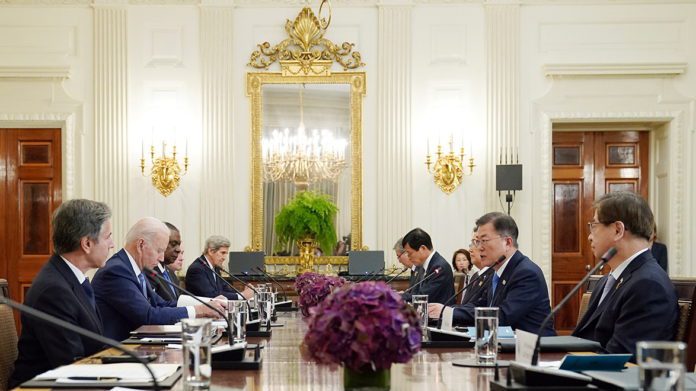This article was originally published by The Korean Herald.
US likely ‘playing along’ as Pyongyang not ready to play ball.
The Biden administration is skeptical of Seoul’s diplomatic initiative to utilize an end-of-war declaration as a standalone measure to reboot nuclear diplomacy with North Korea.
Essentially, Washington’s doubts of the Moon Jae-in administration’s proposal have grown as North Korea began to raise the costs for declaring an end to the Korean War.
The US interprets North Korea’s move as in line with its apathy toward resuming nuclear negotiations and the denuclearization process.
In light of its reservations, Washington’s coordination on an end-of-war declaration with South Korea constitutes alliance management and goodwill gestures to its key ally in the Indo-Pacific region, whose importance is growing in the intensifying US-China rivalry.
More importantly, an end-of-war declaration as a standalone measure can neither solve the fundamental cause of the standoff and mutual mistrust nor narrow the gaps between the US and North Korea.
North Korea will not likely return to the negotiation table without further concessions in view of the country’s recalibrated nuclear calculus and its long-term strategy to prepare for a prolonged stalemate with the US.
Biden administration’s skepticism
The Biden administration is skeptical, cautious and restrained about Seoul’s proposal to utilize the declaration as a standalone measure to revive nuclear negotiations, US experts said in an interview with The Korea Herald.
“I believe the Biden administration would be receptive to an end-of-war declaration if it is part of a package that also advances the process of denuclearization, but not as a stand-alone measure,” said Robert Einhorn, a senior fellow at the Brookings Institution.
“It is skeptical that such a declaration, on its own, would bring the North Koreans to the negotiating table,” Einhorn, who also served as the US State Department’s special adviser for nonproliferation and arms control, added.
Washington’s skepticism stems from North Korea’s recent move to attach undue and specific preconditions for declaring an end to the Korean War.
Pyongyang clarified its preconditions by issuing a series of statements under the name of senior officials immediately after South Korean President Moon Jae-in reproposed an end-of-war declaration during his UN speech in September.
Kim Yo-jong said the withdrawal of the US’ “inveterate hostile policy” and “unequal double standards” against North Korea’s military buildup, including its missile tests, should precede an end-of-war declaration.
North Korean leader Kim Jong-un in September publicly confirmed the preconditions are the country’s “invariable demand” in his policy speech, targeting the domestic and international audience.
“Such statements reinforce the Biden administration’s skepticism toward the declaration as a means of getting negotiations underway,” Einhorn said.
In addition to the public statement, Pyongyang is said to have proposed the suspension of the South Korea-US joint military drills and partial lifting of the UN sanctions on refined oil, minerals, medicine and other necessities as the preconditions for resuming dialogue on a declaration, according to South Korea’s National Intelligence Service.
North Korea: Raising bar for dialogue
The move is in line with Pyongyang’s tendency of gradually raising the bar for resuming working-level negotiations, further fanning doubts on North Korea’s willingness to engage in the denuclearization process.
In particular, North Korea’s demand to withdraw the US “hostile policy” has made Washington doubtful as to whether an end-of-war declaration would lead to denuclearization steps.
The hostile policy is an undefined concept that has been used by Pyongyang to demand a broad range of US concessions.
“An end-of-war declaration would not achieve progress toward denuclearization,” said Bruce Klingner, a senior research fellow at the Heritage Foundation. “North Korea habitually demands an end to US ‘hostile policy’ and upfront concessions as a precondition for returning to talks.”
But US experts underlined that Washington would be willing to discuss an end-of-war declaration as part of comprehensive negotiations toward the end goal of complete denuclearization and peacebuilding on the Korean Peninsula.
In Washington, there is also the view that North Korea is “less incentivized itself to offer up major concessions” in return for a declaration given that the option is “not necessarily a costly signal” to the country.
“As a result, there’s skepticism that a declaration can be offered up early in a sequenced denuclearization process with North Korea,” said Ankit Panda, a senior fellow at the Carnegie Endowment for International Peace.
“Rather, a declaration may be considered as a show of goodwill early in the course of implementing a denuclearization road map.”
This is the last of a three-part series on Washington’s view of an end-of-war declaration.
Ji Da-gyum is a reporter for The Korean Herald.
To read more, please click here.


